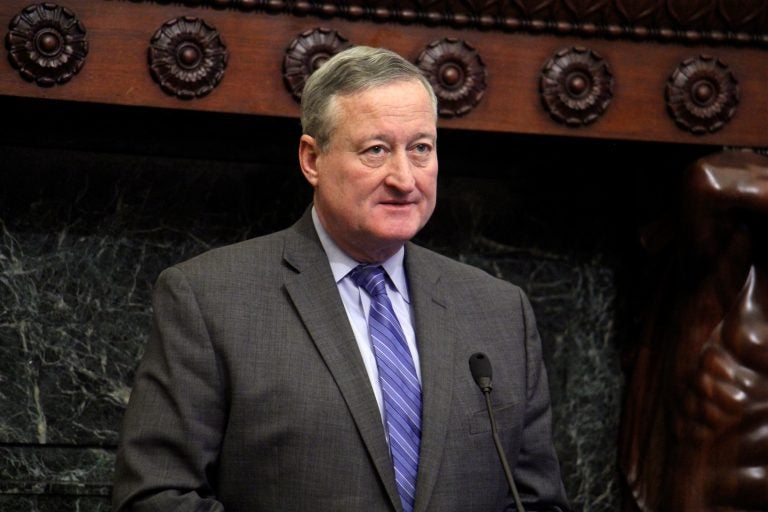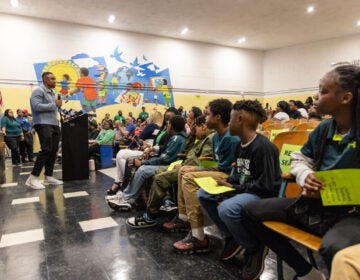SRC will be out by June, replaced by Philadelphia school board
The School Reform Commission's days appear to be numbered. Jim Kenney released a plan to replace it with a locally appointed school board that would run Philly's schools.

Philadelphia Mayor Jim Kenney has received a list of 18 more candidates to consider as he works to assemble a nine-member city school board to replace the School Reform Commission. The candidate pool now stands at 45. (Emma Lee/WHYY)
Mayor Jim Kenney plans to replace Philadelphia’s School Reform Commission with a local school board appointed by him and approved by City Council.
Kenney will outline his proposal in a speech Thursday morning, according to a handful of his advisors. It is the clearest sign yet that the SRC — a 16-year experiment in state control over Philadelphia’s public schools — will end soon.
According to a document released Wednesday and the statements from city officials, it appears likely Kenney will also outline a plan Thursday to raise more city money for schools.
“The District is now in a situation in which it has already made painful cuts and one of its two primary funders, the Commonwealth, is mired in budget stalemates,” says a document outlining the city’s plans shared with reporters Wednesday evening. “This makes the other major funder, the city of Philadelphia, the only realistic source of substantial new funding for the School District. Mayor Kenney believes that the City can and must commit to this investment to protect and accelerate the District’s progress. In return, Philadelphians deserve the greater accountability which local control will provide.”
Deputy Mayor Jim Engler and Budget Director Rob Dubow would not preview what Kenney plans to request in order to boost the city’s contribution to the district, which is facing a structural deficit that could balloon to more than $900 million by 2022.
“The mayor is prepared to present a budget that will provide additional resources [for the schools],” said Engler. “And with that should come local control for the taxpayers and voters in Philadelphia.”
In a letter accompanying the document, called Ensuring Quality Schools for Every Philadelphia Child, Kenney writes, “Unless we want to return to the days of classrooms without teachers and schools without nurses, Philadelphia must step up, again. In return for their investment, Philadelphians deserve greater accountability and accelerated results, and … I think that’s what local control can bring.”
The SRC began in December 2001 as part of a deal between city and state officials. City officials needed more money for Philadelphia’s beleaguered school system. State officials wanted greater say in how the system operated and were eager to accelerate privatization and charter school expansion.
The five-member body is comprised of three gubernatorial appointees and two mayoral appointees. Under state law, the SRC can vote itself out of existence if it passes a dissolution resolution, which is then approved by the Pennsylvania Secretary of Education, Pedro Rivera.
That vote will likely happen at the SRC’s next meeting on Thursday, November 16. If the resolution passes and Rivera certifies it before the end of the calendar year, the SRC will cease to exist on June 30, 2018.
Without further city action, the SRC would be replaced by a nine-member school board appointed by the mayor, which is what existed before the SRC took control. Kenney, however, supports tweaking that model by giving City Council the power to approve all appointments. That tweak requires a voter referendum, which officials said would likely happen next May.
The new board members would serve terms coterminous with the mayor’s own and at his pleasure, giving him full political control over the body.
City Council may consider such a resolution at its Thursday session, after Kenney delivers his education address.
Engler said Kenney believes there are four key factors that will make local control work: accountability, strong management, adequate resources and quality collaboration between the city and the district.
Administration officials expect nominations for the new school board to be made by February or March of next year. Before that, a 13-member Education Nominating Panel, also appointed by the mayor, will recommend three names for each of the nine slots, for a total of 27.
‘This is where we’re going’
Kenney’s announcement comes after months of pressure from anti-SRC activists to return the district to local control, but his announcement won’t mollify all of them. Some advocates want Philadelphia to have an elected school board, which is the governance structure in all the other 499 Pennsylvania school districts.
Philadelphia, however, has never elected people to run its schools, at least not since before the Civil War. Some worry the elections would be low-turnout and controlled by special interests, such as the teachers’ union — or, on the other end of the political spectrum, dominated by candidates supported by outside money favoring charter expansion as happened in Los Angeles.
Pennsylvania state law prohibits unelected school boards from levying their own taxes. That means Philadelphia’s new school board, if it comes to pass, will receive most of its money from the state and city governments, just like the SRC and its predecessor Board of Education.
Kenney does not support an elected school board, according to Engler. An elected school board would diffuse accountability, he said, while the mayor wants more centralized responsibility for what happens in the city’s public schools.
During the tenure of the SRC and in his 2015 campaign for mayor, Kenney, a longtime member of City Council before, did not emphasize a return of the district to local control.
Though he’s never explicitly opposed dissolving the SRC, he’s often urged caution. While campaigning, Kenney worried that dissolving the body could alienate Harrisburg Republicans and encourage them to withhold money from the district. Philadelphia’s schools face a structural deficit that could balloon to nearly a billion dollars by fiscal year 2022.
Kenney, however, has been hinting about governance changes for months now, even if he hasn’t moved as quickly as some advocates wanted. When he appointed current SRC chair Joyce Wilkerson a year ago, he mentioned he was “preparing for a smooth transition to greater local control.”
According to his aides, he has decided the time is ripe now for several reasons, including the possibility that Gov. Wolf, a Democrat, could lose next year’s gubernatorial election to a Republican hostile to the city’s needs.
It has also become clear to him that one of the major reasons for the state takeover through the SRC — giving the state more control so it could restore fiscal stability to the district — wasn’t going to happen. Since Kenney became mayor, Harrisburg has considered three budgets, and all of them produced a stalemate between the governor and Republican legislature. And efforts at statewide school funding reform have not yet resulted in a formula that bases all state aid on each district’s actual enrollment, ability to pay and measures of student need.
The state Supreme Court has agreed to hear arguments in a lawsuit over fair and adequate state funding brought by several districts and individual parents that could result in more money for Philadelphia. But nothing is guaranteed.
But looming large in Kenney’s thinking was a growing realization that quality education for all children holds the key to the city’s future.
“If we fix education and we get our kids educated, all those other miseries that we deal with will subside,” Kenney said Wednesday morning during an event unveiling a new website where potential donors could find individual school projects to support. “We won’t have an opioid crisis if we have everyone working. We won’t have people shooting each other if they’re going to work. Those kinds of things will resolve themselves and we’ll have less need for courts and prosecutions and police, and all the other things we spend money on, we could be spending on education.
“We’ve got to get there. It’s not going to be overnight, but we’ve got to point in the right direction, and this is where we’re going, and we’re not going back to the bad old days of making that poor guy, [Superintendent William] Hite, have to cut and cut and cut. It’s terrible.”
Where will the money come from?
How the city will raise additional money for the schools has not yet been decided, aides to the mayor said. Now, most of the district’s city funding comes from the property tax, but there are also a group of other smaller taxes dedicated for schools, including the liquor-by-the-drink tax, a school income tax and the recent one percent increase in the sales tax. A new tax on sugary drinks is also generating revenue to support Kenney’s education initiatives, including expanded pre-K and community schools.
Aides indicated that several ideas are on the table, including a property tax increase, giving a higher percentage of the property tax to the district (it is now 55 percent), and ending or reducing the tax abatement for new residential construction that impacts the district more than the city. Nearly half the district’s revenue comes from the property tax, but it only accounts for around 20 percent of city revenues.
City government will also be working on improving the historically distant if not dysfunctional relationship between city agencies and the district when it comes to sharing information that could result in better delivery of social services for families and children.
Historically, City Council has regarded district needs as secondary to its own, frequently berating district officials during their annual pilgrimage to City Hall when to explain budget priorities and, occasionally, request new revenues.
“School District needs will and should be considered at the same time as we consider needs of the [city] departments,” Engler said. “Collaboration is something we will specifically focus on.”
WHYY is your source for fact-based, in-depth journalism and information. As a nonprofit organization, we rely on financial support from readers like you. Please give today.





